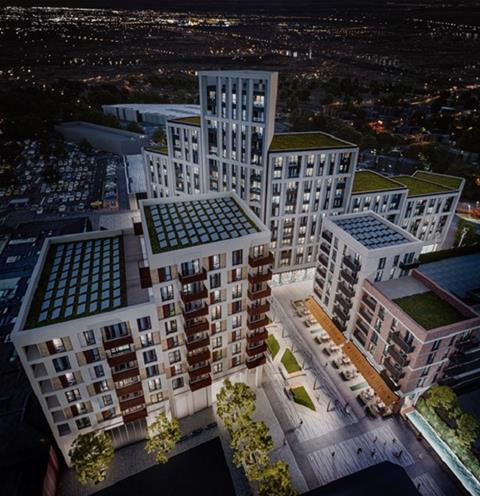Sovereign, Optivo and Great Places all report impact of cost rises in half-year figures
Several housing associations have used financial statements to report their difficulties in meeting build targets this year given the inflation rate and labour shortages. They have also expressed fears over the impact of the current financial turmoil on their potential build rates.
Publishing unaudited half-year statements, Great Places and Optivo both said they were behind their targets on completions due to the challenges posed by the current high-inflation environment – primarily around sourcing labour and materials.

In addition, 60,000-home Basingstoke-based association Sovereign said in a second quarter financial update that, while it had increased the delivery of homes on the previous year, projects were being hampered by “resource and material availability issues impacting the whole of the building sector”.
Manchester-based 24,000-home landlord Great Places said it had built 232 homes so far in the 2022/23 financial year, 34 below its target. It said it was working to remove “blockages” to delivery around “labour, materials, approvals and land registration”.
The organisation’s turnover in the period was £79.1m, £1.3m under budget, which it said was mainly down to “delayed 1st tranche sales income and lost rental income from delayed handovers from development”.”
Meanwhile, Sarah Smith, chief financial officer at London-based G15 association Optivo, which manages 43,000 homes in the South-east, said its sales income was “nearly” 10% behind budget “due to build programme slippages caused by labour and materials shortages as well as financial support requests from some contractors suffering build cost inflation”.
She said the association had re-forecast the rest of the financial year as likely to continue with the same reduced rate of sales. Optivo built 202 homes in first half of the financial year, down from 262 this time last year. However, the landlord said its starts rose, to 436, compared with 211 at the same point in the previous year.
Optivo’s half-year turnover was £188m, up 7%, with its operating surplus down to £49m, from £54m last year.
Smith said Optivo had seen a “small number” of cancelled home sales in the wake of the September mini budget. She added: “While development activity has been somewhat hampered by material and labour shortages, as well as cost increases putting suppliers under pressure, we have been completing projects and making new properties available for rent and sale.”
She said: “We are well funded and can rely on existing debt facilities until June 2024 if we continue to develop at the current rate. We did, however, reduce our future build programme at the start of this financial year and we may yet have to scale back further if headwinds continue.”
Sovereign said in a quarterly update that t had delivered 418 completions, compared with just 287 in the second quarter of the 2021/22 financial year. However it said: “Development projects are being challenged by resource and material availability issues impacting the whole of the building sector.
>>See also: Can HAs keep development going as the rest of the market slows?
>>See also: Regulator downgrades 19 housing associations, citing ‘weakening housing market’
The landlord, which missed its performance target for operating surplus in the period due to rising costs, despite seeing turnover rise to £113.3m, added: “Economic uncertainty arises from budget announcements and interest rate increases are likely to be a drag on performance in the second half of the year.”
The results come after the chancellor last week said the government will cap rent increases for the sector at 7% next year, meaning landlords will have to absorb a large part of the wider inflationary cost increases of delivering services into their business plans.
The reports come as housing secretary Michael Gove wrote to housing providers over the weekend calling on them to “raise the bar dramatically” on housing quality in the wake of the death of toddler Awaab Ishak, who was found last week to have died as a result of untreated toxic mould in his housing association flat.











No comments yet